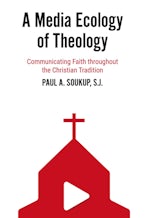As one of our leading scholars in the field of media ecology, Paul Soukup provides a masterful examination of the relationship between theology and communication. Building on the work of scholars such as Marshall McLuhan, Susanne Langer, James W. Carey, Elizabeth Eisenstein, Joshua Meyrowitz, and above all, Walter Ong, he takes us from orality to literacy, typography to electricity, and cinema to social media. Along the way, he also takes up the ecology of translation, education, art, architecture, music, and ritual, as these communication phenomena relate to faith and our sense of the sacred. Media ecology represents a powerful approach to understanding theology on its own terms, rather than reducing it to a function of society, culture, and the psyche, and while Father Soukup’s scholarship is specifically devoted to Christian theology, the insights that he provides can be applied to other religious and spiritual traditions, and to theology in general.
~Lance Strate, Professor of Communication and Media Studies, Fordham University, and author of Media Ecology: An Approach to Understanding the Human Condition
Preaching, writing, singing, or texting: how does communication affect theology? Which are the consequences of shifting media environments for how people reflect on faith? Paul Soukup's new book addresses these (and many more) questions, contributing to a theology of communication in the frame of Media Ecology. From ancient orality to the first forms of 'multimedia experiences' of the 16th and 17th stations of the Cross in European Churches; from early scribal culture to social media culture, Soukup expands W. J. Ong's idea of 'correlatives' to successfully explore 'the interlocking of communication and theology' throughout the Christian tradition. He provides an engaging (and so far, missing) investigation across a multitude of different perceptive and communicative experiences (not only orality and literacy, but also music, architecture, ritual, films, and mobile media), each time questioning the context and the structures of communication, as well as the evolving relationship between communication and theology. Superbly written, this book tells a compelling (and enjoyable) story of how 'form matters,' making readers aware of how old and new mediated ways to communicate faith have played a role in the shaping of communities, mentalities, and, inevitably, theology.
~Elena Lamberti, North American Literatures, University of Bologna
In A Media Ecology of Theology, Paul Soukup provides a fascinating account of the various ways in which the Christian Church’s thinking can be explored in the context of ideas rooted in the media ecology intellectual tradition. By examining the nature and function of theology through the lens of communication forms, with particular attention to the theological expressions throughout history, from the earliest Christian communities to contemporary culture, the book offers a systematic reflection and important addition to the conversation about belief and religious experience. Featuring a comprehensible writing style and a consistent approach, A Media Ecology of Theology is a timely and thought-provoking review of the Christian tradition in light of the web of interdependencies and the development of various forms of communication ecologies.
~Paolo Granata, Book & Media Studies Assistant Professor and Program Coordinator, University of Toronto
An expansive volume drawing from the widest range of communication study, linguistics, philosophy, and religion, Paul Soukup’s book was a pleasure to read. Through his in-depth tour of the media landscape surrounding the changing face of religion, the author is able to reveal wide gaps of interpretative possibilities, reminding readers that we can count on the continuing evolution of Christian theology as the Digital Age advances.
~Stephanie Bennett, Journal of Christian Teaching Practice

